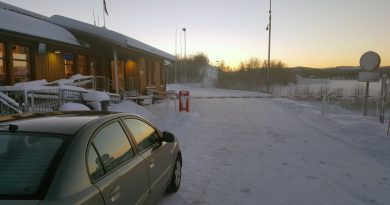Iqaluit teens in Arctic Canada take to the street to demand more suicide prevention for Nunavummiut
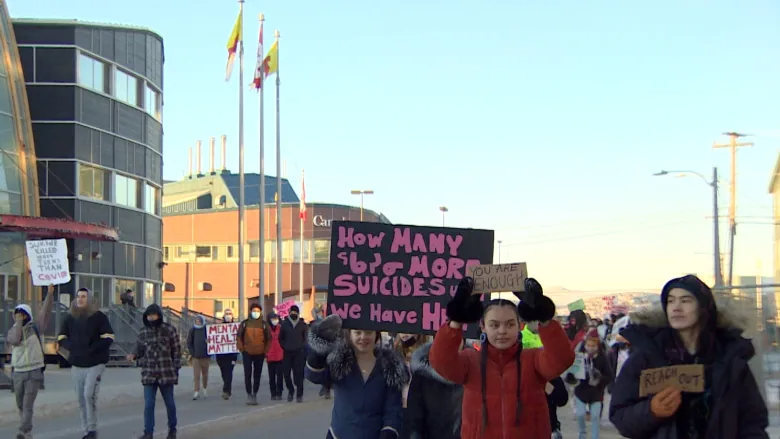
‘We have no … clean running water, and it’s getting cold. It’s getting 10 times harder to manage up here’
Youth in Iqaluit marched from Inuksuk High School to the Nunavut Legislature on Tuesday to deliver a message to government officials: suicide prevention needs to be addressed now.
High school students carried signs reading “suicide is not the answer” and “mental health matters” and more.
In Nunavut, nearly every family has been touched by the loss of a loved one, they said.
The demonstrators also asked the federal government to build a mental health facility in Nunavut.
Joseph Ashoona, who helped to organize the march, said some people tend to “just drink our pain away” or “smoke our pain away.”
“That’s not the answer — the answer is to get help and that is what we want,” Ashoona said.
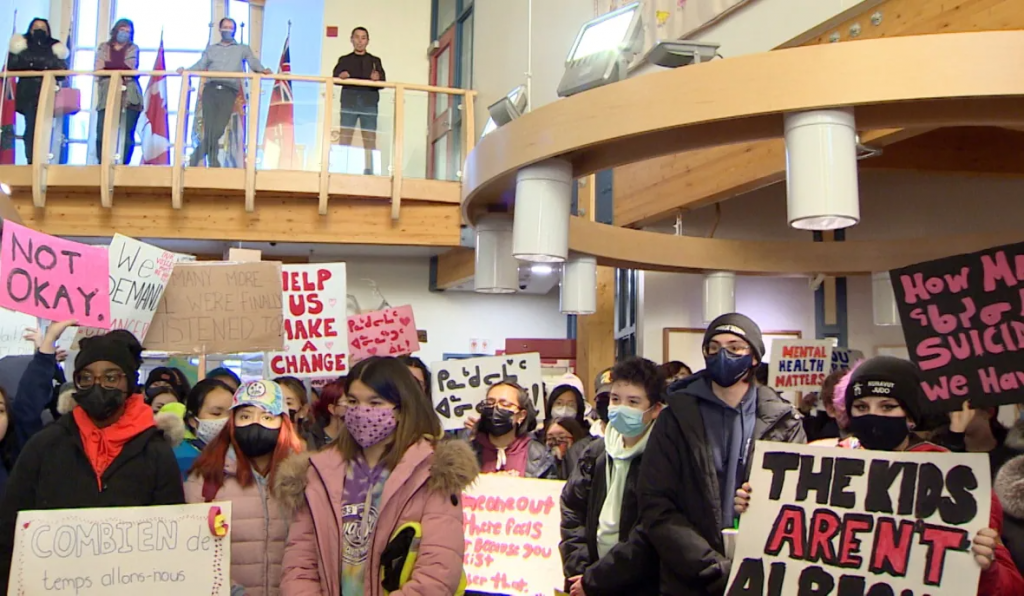
Co-organizer Deion Pearce said the federal government could do a lot more to help.
“Why were we overlooked for so long, and when are we finally going to get this change?” Pearce said. “I’m trying to make a change in Nunavut.”
Pearce said people in Nunavut have been asking for help for a long time but “just haven’t been given help.”
“So it is just about time that we’re speaking up and striving for change,” he said.
“I’d like to see the Canadian government honestly step up a lot more in what they’re doing for Nunavut. And I’d like to see a lot more communities in Nunavut do the same thing that we’re doing, or speak up for themselves as well.”
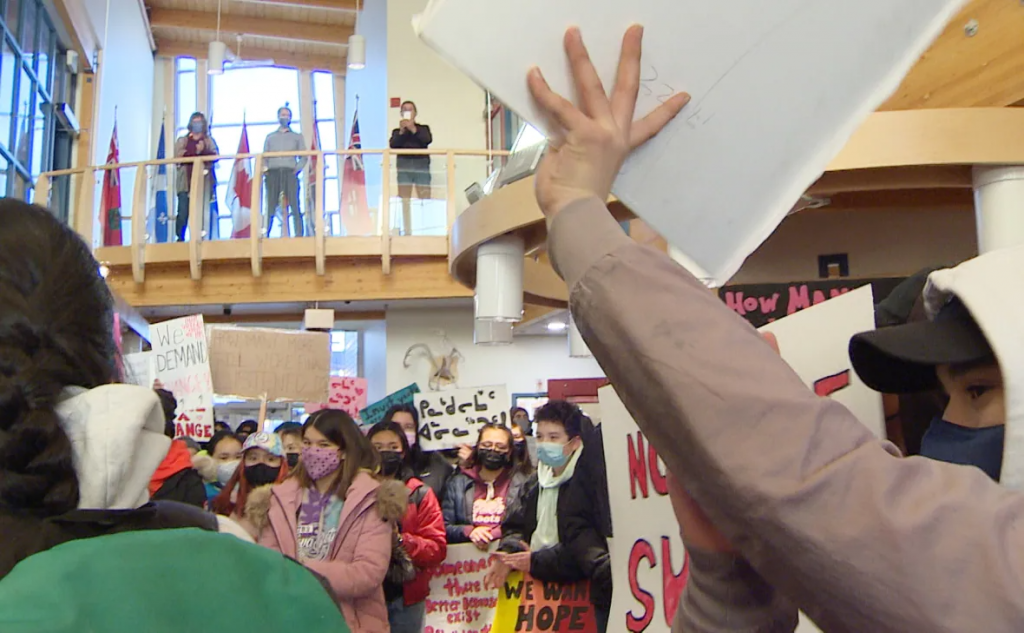
Both Ashoona and Pearce say they’re tired of seeing people in the community hurting.
Dignitaries such as the newly elected MLA for Iqaluit Sinaa Janet Pistiulaaq Brewster and former premier Joe Savikataaq addressed the protesters, offering their support. In all, there were about 80 to 100 people at the event, including a handful of parents.
NDP leader Jagmeet Singh happened to be in Iqaluit at the time of the demonstration.
“I want you to know you have been heard,” Singh said.
Pearce cautioned that if protesters don’t get what they need, the peace could fade.
Meanwhile, Minnie Akeeagok said she lost her best friend to suicide less than a year ago.
“This really has affected me. And this is what we need to be able to move forward and get better help for youth,” she said.
Akeeagok said there needs to be more community-based projects to bring people closer together. She said for those who are struggling, help is available.
“There’s a lot of different resources that you could go to, to be able to talk and speak on how you’re feeling. You could talk to family friends, anyone’s here for you,” she said.
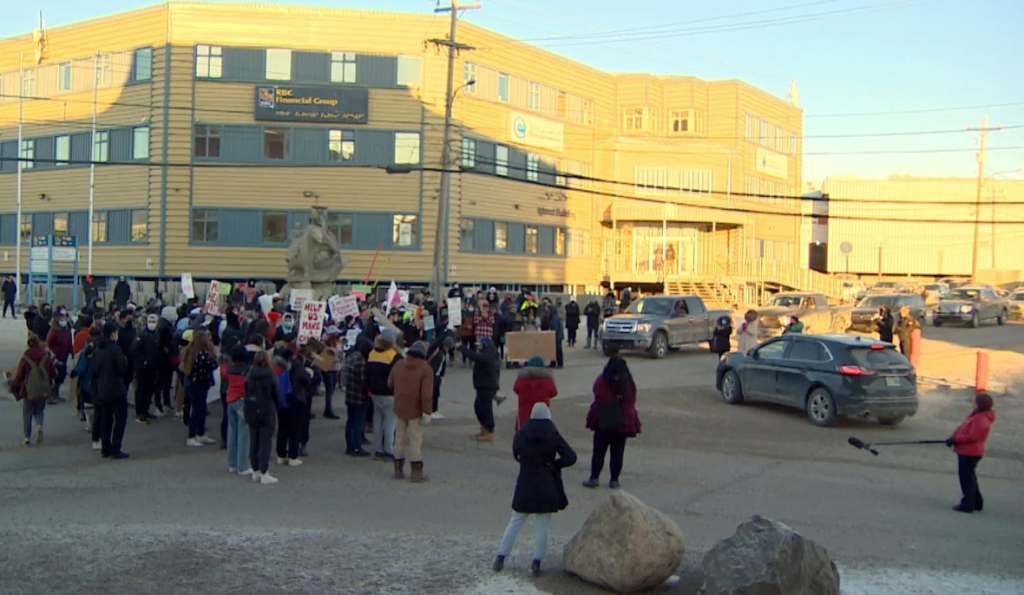
Jaydin Nungaq said he felt overwhelmed during the demonstration. “It was like, no emotion. It was just all over the place,” he said.
“I honestly feel very reassured that there’s youth, not only me, but there’s youth in schools that are willing to go out there and just protest for our community.”
He said that’s among the things that matter most especially now while Iqaluit has been in the midst of a water crisis since October.
“In this situation where we have no … clean running water, and it’s getting cold,” he said. “It’s getting 10 times harder to manage up here.”
He added he wants to see youth getting more actively involved with mental health in the community.
To the government, he said he hopes “we’re in good hands.”
“If you start talking to youth, and reaching out to youth leaders in the community, and all over the territory, that’s how you’re going to know how to help,” he said.
If you’re experiencing emotional distress and want to talk, call the Hope for Wellness Help Line at 1-855-242-3310.
For help in Inuktitut, you can call the Kamatsiaqtut Nunavut Helpline at 1-867-979-3333 or, toll-free from Nunavik or Nunavut outside Iqaluit, at 1-800-265-3333.
-With files from Toby Otak
Related stories from around the North:
Canada: Inuit helping Innu community deal with suicide crisis, CBC News
Russia: Why high suicide rates in Arctic Russia?, Deutsche Welle’s Iceblogger
Sweden: Gender stereotypes behind high suicide rate, Radio Sweden
United States: Alaska’s suicide rates jump 13 percent, report shows, Alaska Public Media


